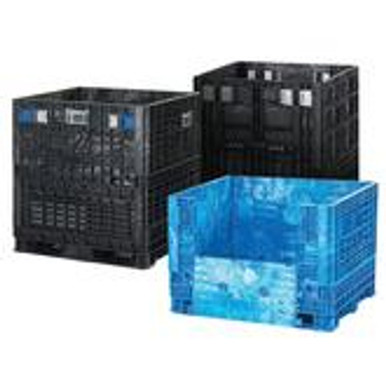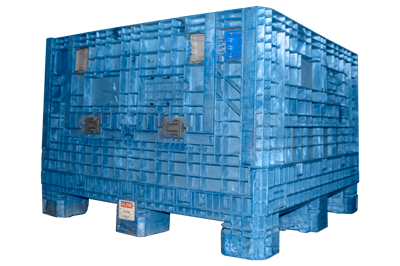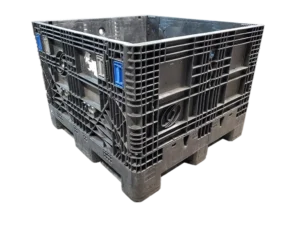Why Bulk Containers Are Vital for Economical and sustainable Transport
Mass containers play an important duty in modern logistics. They promote the efficient activity of huge amounts of items, thereby optimizing transport processes. This technique not only decreases prices yet likewise minimizes ecological impact via lower emissions and waste generation. As industries seek even more lasting methods, the adoption of bulk containers is becoming progressively substantial. What ramifications does this shift hold for future logistics and supply chain administration?

The Advantages of Making Use Of Bulk Containers in Logistics
Mass containers revolutionize logistics by boosting effectiveness and sustainability. These containers enable the transportation of big quantities of products in a single trip, significantly lowering the number of trips needed. This not just enhances procedures yet also reduces labor expenses related to handling, loading, and dumping. Furthermore, mass containers are developed to enhance area usage within transportation vehicles, ensuring that more items can be delivered at the same time.
The standardization of bulk containers additionally simplifies the logistics procedure. With consistent dimensions, they can be quickly stacked and saved, leading to improved storage facility monitoring. Furthermore, bulk containers commonly feature sturdy products that secure contents from damages throughout transportation, consequently decreasing product loss and increasing general dependability. As a result, companies can experience improved supply chain efficiency, ultimately bring about enhanced profitability and customer contentment. This combination of elements makes mass containers a critical possession in modern logistics.
Ecological Impact: Decreasing Waste and Carbon Impact
As sectors increasingly prioritize sustainability, the fostering of bulk containers has become an essential technique for minimizing waste and reducing carbon footprints. These containers lessen making use of product packaging products, such as boxes and plastic, consequently significantly reducing overall waste generation. By settling shipments, bulk containers improve transportation effectiveness, permitting for even more products to be delivered per trip. This decrease in journeys straight correlates with lower greenhouse gas discharges, adding to a smaller carbon footprint.
Moreover, bulk containers can usually be reused or recycled, further reducing environmental effect. The longevity of these containers guarantees they can withstand multiple transport cycles, lowering the need for single-use options. used plastic containers. By streamlining logistics and promoting efficient resource use, mass containers not only sustain lasting techniques yet also encourage industries to straighten with international environmental objectives. Inevitably, their execution shows a dedication to ecological stewardship and responsible resource monitoring
Price Cost Savings: How Bulk Containers Lower Transport Costs
While numerous companies look for methods to enhance their lower line, the usage of bulk containers offers a substantial chance for lowering transport costs. Bulk containers make best use of the quantity of products carried, enabling businesses to deliver bigger quantities at when. This efficiency reduces the variety of journeys required, straight decreasing gas expenses and lessening labor expenses connected with loading and unloading.
In addition, mass containers typically feature structured layouts that enhance space utilization within transportation automobiles. This means less empty rooms, leading to extra reliable use available capacity. Moreover, the sturdiness of mass containers can lower the threat of item damage throughout transit, guaranteeing and reducing losses that more products show up undamaged.
Enhancing Supply Chain Performance With Mass Storage Solutions
Bulk storage space remedies play a vital duty in boosting supply chain effectiveness by optimizing inventory administration. By settling goods into fewer, larger containers, organizations can significantly minimize taking care of costs associated with constant transfers and handling. This structured strategy permits far better monitoring and monitoring of stock, eventually causing boosted functional efficiency.
Streamlined Inventory Management
Effective supply management is vital for optimizing supply chain operations, particularly when organizations embrace bulk storage services. These options allow companies to maintain greater supply degrees while lessening the regularity of replenishment. By combining materials right into mass containers, business can streamline their supply procedures, decreasing the complexity related to tracking multiple smaller packages. This technique facilitates precise inventory counts and boosts projecting accuracy, enabling more enlightened decision-making. Furthermore, mass storage services simplify warehouse company, making it less complicated to find and accessibility items when needed. Consequently, companies can accomplish a more reliable stock turnover rate, ultimately boosting general supply chain performance and reducing the chance of stockouts or overstock situations.

Reduced Handling Expenses
The implementation of bulk storage space options not just streamlines stock monitoring but likewise substantially reduces dealing with expenses throughout the supply chain. By settling materials into mass containers, companies reduce the demand for regular handling and transfer between different storage and transportation devices. This strategy minimizes labor costs connected with loading, discharging, and relocating smaller sized plans. In addition, mass storage space lowers the regularity of deliveries, leading to lower transportation costs and lowered gas intake. Consequently, organizations can enhance their logistics procedures, enabling for a much more effective allowance of sources. Inevitably, lowered managing prices add to improved general supply chain effectiveness, cultivating an atmosphere that supports both sustainability and economic viability.

Flexibility of Mass Containers Across Numerous Industries
Lots of sectors have distinct demands for transport and storage space, bulk containers have arised as a functional service that fulfills a large range of demands. These containers, ranging from huge bins to specialized tanks, can fit varied materials, consisting of granules, powders, and fluids. In the farming market, mass containers facilitate the transportation of grains and plant foods, while the food and beverage market utilizes them for components and completed products. The chemical industry counts on bulk containers for safely carrying harmful products, guaranteeing compliance with safety regulations. In addition, construction companies take advantage of mass containers for delivering accumulations and various other materials. Their adaptability extends to various settings of transportation, including ships, trains, and vehicles, enhancing logistical performance. This convenience not just improves operations across various markets however also advertises sustainability by minimizing packaging waste and optimizing room en route. Bulk containers play a crucial duty in contemporary supply chain management.
Future Fads in Mass Container Usage and Sustainability
The future of visit this site mass container usage is progressively shaped by innovative products development that improves sustainability. Furthermore, automation in logistics assures to improve operations, minimizing waste and improving performance. Embracing circular economic climate practices will better transform just how bulk containers are designed, made use of, and recycled, cultivating a more lasting transport landscape.
Innovative Materials Growth
As sectors increasingly focus on sustainability, innovative products growth wholesale containers emerges as a substantial aspect in enhancing green transportation services. Manufacturers and researchers are exploring eco-friendly plastics, recycled compounds, and light-weight metals to decrease environmental influence. These materials not only decrease waste however likewise boost gas efficiency by reducing the general weight of containers. Furthermore, innovations in smart materials, which can adapt to varying conditions, enhance This Site the toughness and capability of mass containers. The assimilation of these cutting-edge products straightens with round economic climate concepts, promoting reuse and recycling. As the demand for sustainable practices grows, the development of such materials will play a vital role fit the future of mass container usage in logistics and transport.
Automation in Logistics
Substantial innovations in automation are positioned to change logistics and the use of bulk containers, enhancing sustainability in transportation. Automated systems, including drones and autonomous vehicles, are enhancing the motion of bulk containers, decreasing the reliance on traditional fuel-powered transportation. These modern technologies maximize directing and packing processes, decreasing vacant miles and enhancing fuel performance. In addition, automated stock management systems boost monitoring and tracking of bulk containers, ensuring far better resource allowance and minimized waste. The integration of the Net of Points (IoT) allows real-time information analysis, making it possible for positive decision-making that aligns with sustainability objectives. As automation remains to develop, it is expected to drive better advancements wholesale container usage, inevitably supporting more lasting logistics methods and reducing the environmental effect of transport.
Circular Economic Climate Practices
Advancements in automation are establishing the phase for a much more incorporated technique to round economy methods in the domain name of bulk container use. As sectors increasingly welcome sustainability, bulk containers are being designed for durability and reusability. This change not just minimizes waste however also boosts resource performance. Companies are embracing strategies such as closed-loop systems, where utilized containers are accumulated, reconditioned, and reintroduced into the supply chain. Furthermore, smart innovations track container life process, helping with better administration and decreasing ecological impact. The collaboration in between producers, logistics suppliers, and end-users is necessary in establishing standards for sustainable container use. refurbished bulk containers. Future patterns show a growing emphasis on materials that are naturally degradable and recyclable, further reinforcing the circular economic climate's principles in mass transport

Regularly Asked Concerns
What Products Are Mass Containers Normally Made From?
Bulk containers are commonly built from sturdy materials such as high-density polyethylene, cardboard, steel, and light weight aluminum. These products provide flexibility, toughness, and protection, making them suitable for transporting various products in different markets effectively.
Exactly how Do I Select the Right Size Mass Container?
Choosing the best dimension bulk container entails examining the volume of materials to be delivered, considering handling equipment compatibility, and assessing storage space demands. Correct dimension guarantees efficiency in transportation and reduces waste throughout delivery.
Are Mass Containers Reusable or Recyclable?
Mass containers are frequently recyclable, designed for check this multiple trips, boosting sustainability. Many can additionally be recycled, depending on the products utilized. Selecting recyclable choices additionally sustains environmental objectives and decreases waste in transportation methods.
What Safety And Security Regulations Put On Mass Container Transportation?
Safety and security regulations for bulk container transport include compliance with the Division of Transportation guidelines, correct labeling of dangerous materials, architectural honesty assessments, and adherence to weight limitations to guarantee secure handling and stop mishaps during transportation.
How Can Services Shift to Utilizing Mass Containers Properly?
Businesses can alter to bulk containers by reviewing present logistics, training team on handling, investing in suitable equipment, maximizing inventory administration, and teaming up with suppliers to assure compatibility and efficiency throughout the supply chain.
As sectors progressively prioritize sustainability, the adoption of mass containers has actually arised as a crucial approach for minimizing waste and reducing carbon impacts. By consolidating materials into bulk containers, firms can enhance their inventory procedures, reducing the complexity linked with tracking numerous smaller sized bundles. As markets progressively prioritize sustainability, ingenious materials advancement in bulk containers emerges as a substantial aspect in enhancing environmentally friendly transport solutions. Automated systems, consisting of drones and autonomous cars, are enhancing the motion of mass containers, decreasing the dependence on standard fuel-powered transport. In addition, automated supply management systems enhance monitoring and tracking of bulk containers, guaranteeing much better source allocation and decreased waste.